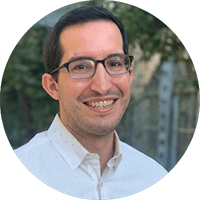Caring for the Caregivers
The transition from in-person to online learning necessitated by COVID-19 had many implications, including detrimental effects on student mental health. Precisely at an age when social interaction is crucial for development, lockdowns separated students from their peers. This separation, in addition to academic concerns, generated stress and anxiety in children. During this challenging period of rapid change, teachers were expected to create stability and certainty both in their capacities as teachers in the virtual classroom and as caregivers for the students.
This extra layer of responsibility needs to be appreciated as being in addition to educators’ own increased mental health stressors. Educators dealt with their own struggles during the pandemic: learning new digital skills, caring for elderly parents, managing children who were learning from home, navigating the new implications of having parents as a potential zoom audience, anticipating professional insecurity, and dealing with the financial implications of the new work environment. Leah Juelke, an experienced and award-winning teacher interviewed about her experiences over the last year, says that nothing prepared her for teaching during the coronavirus pandemic: “The level of stress is exponentially higher. It’s like nothing I’ve experienced before.”
In February 2021, an informal survey of more than 50 Jewish educators in North America revealed that two-thirds of teachers reported not receiving additional mental health support for themselves, nor additional professional development for how to support the emotional needs of their students. Almost half of the respondents (43%) offered suggestions for additional training that they would request from their institutions. This could indicate that educators are aware of the current resources to support their students but believe that additional resources are necessary during the pandemic.
This survey confirmed important trends that we noticed throughout the year with our fellows. At TalentEducators, we recruit talented people to the field of Jewish education. Our main focus is bringing new people to the field and finding them the right positions for their unique strengths. In order to ensure the success of these placements, we create and fund bespoke training and mentoring plans for our fellows, supporting each individual in his or her particular position. To that end, we provide our fellows with ongoing support to develop their pedagogy and content. Part of this support involves monthly meetings with their peers in a professional learning community. We noticed over the course of COVID-19 how these groups shifted their focus from content-based discussion to conversations and strategies around emotional support both for themselves and for their students.
In our six cohorts this year, we have seen educators searching for tools to support their students’ wellbeing as well as their own. For example, in our middle school and high school Judaic studies teacher cohort, our fellows identified the major stressors as (1) the near-constant ”unknowns”, (2) balancing student needs with the curriculum, and (3) being COVID rule enforcers more than educators, mentors, and friends to their students. This led our facilitator to create sessions on attuned listening in order to support our fellows’ ability to create a sense of community and belonging for their students, and perhaps for themselves as well.
This past summer, Prizmah conducted a pulse survey that polled 81 school leaders about the effects of COVID-19 on areas such as educational models, enrollment, and budget. The survey revealed professional development as the area that school leaders cut the most from their budget. Respondents reported cutting between 25-75% of their annual professional development budget. Without a doubt, this on-the-ground decision was not taken lightly. That said, given what we know about how isolating the teaching profession can be, and given what we now know about the significant mental health stressors in the midst of the pandemic, perhaps this strategy needs to be re-examined in the long term. We need to double down on support for our teachers rather than cut those services, and that support needs to reflect the new roles that teachers serve in our (almost) post-pandemic world.
As we enter the upcoming school year, we advocate for a shift in professional development and training for educators. This shift should recognize teachers’ role as caregivers for their students and should support them accordingly. This means that professional development and training programs that generally focus on curricula and content should be heavily integrated with social-emotional learning techniques. In addition, educational leaders need to focus on educators’ mental health and actively support it through proactive conversations, intentional check-ins, and staff workshops. We believe that this shift in support will directly translate into stronger developmental and academic outcomes for our students.
Virginia Leona Archer, a middle school teacher in Arlington, recently pointed out in an article on NPR: “Our profession is a nurturing one, but we also are humans that need to be poured into. We need to be nurtured, too.”

Yael Harari is the COO of TalentEducators. TalentEducators is a joint project of Israel’s Ministry of Diaspora Affairs and the Jewish Agency focused on recruiting and retaining high-quality Jewish educators.

Marc Fein is the Experiential Education Coordinator at TalentEducators.



